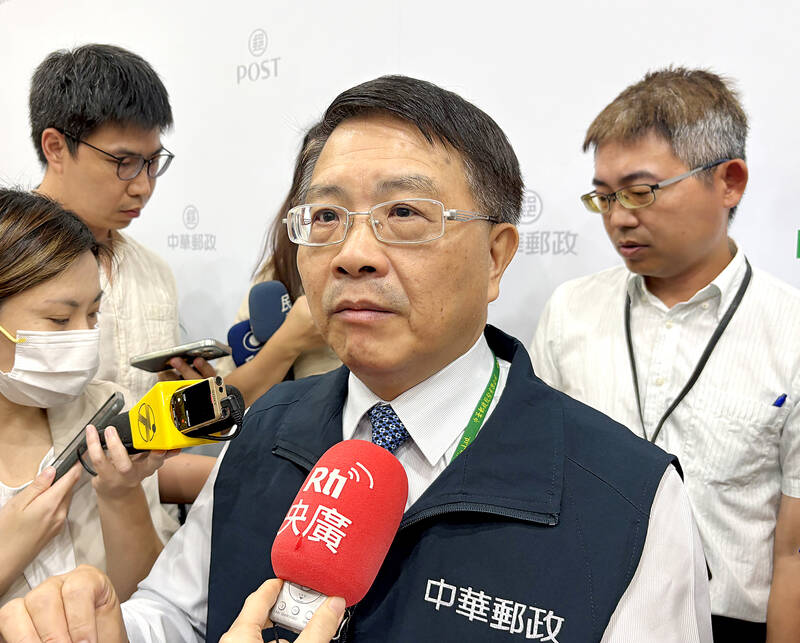Consumers must now pay nearly twice as much to send small parcels to the US, after Chunghwa Post yesterday suspended acceptance and delivery of such shipments in response to changes in US tariff policy.
Starting on Friday, the US would eliminate the de minimis exemption that had allowed goods valued at US$800 or less to enter duty-free. From then on, tariffs would apply to all imported goods, regardless of value.
As the global postal system does not yet support prepayment of tariffs, international postal operators — including Chunghwa Post — have halted small-parcel shipments to the US.

Photo: Lin Chih-yi, Taipei Times
Those in Taiwan who still need to send packages can do so via express carriers such as FedEx and DHL, Chunghwa Post said.
The state-run postal service charges NT$1,310 (US$43) for parcels of 1.5kg or less, compared with NT$2,499 at DHL and NT$3,958 at FedEx. These rates exclude tariffs, which depend on the declared value of the goods.
“It [suspending shipment of parcels to the US] is a decision that has to be made,” said Ke Ching-chang (柯清長), the postal firm’s Department of Mail Business and Operations director.
The US had initially expected parcel carriers to collect tariffs on its behalf, but in practice this has proven difficult, he said.
Chunghwa Post is not alone. Hong Kong suspended parcel shipments to the US in April, while Japan Post and India Post followed suit last week and this week respectively, Ko said.
Of all mail and packages handled by Chunghwa Post, only about 1 percent is international, although such shipments generate about 10 percent of total postal revenue, Ko said.
Last year, the postal service delivered 340,000 items to the US, making up 14 percent of all international mail and packages and 24 percent of revenue from international services, he said.
About 97 percent of those parcels contained goods valued at US$800 or less, he added.
Suspending deliveries of the parcels to the US could cause the state-run postal firm to lose NT$365 million in annual revenue, Ko said.
Most parcels sent to the US contained personal items and daily necessities, along with product samples and goods shipped by small and medium-sized e-commerce platforms, Ko added.
The company cannot provide a timeline for when US parcel deliveries might resume, he said.
“We would follow the International Postal Corp in establishing a mechanism to collect US tariffs in Taiwan,” he said. “We would first communicate with international express delivery couriers as well as with Customs Administration officials. So far, we can only plan ahead and pursue possible solutions. We cannot offer any specific timeline.”

Alain Robert, known as the "French Spider-Man," praised Alex Honnold as exceptionally well-prepared after the US climber completed a free solo ascent of Taipei 101 yesterday. Robert said Honnold's ascent of the 508m-tall skyscraper in just more than one-and-a-half hours without using safety ropes or equipment was a remarkable achievement. "This is my life," he said in an interview conducted in French, adding that he liked the feeling of being "on the edge of danger." The 63-year-old Frenchman climbed Taipei 101 using ropes in December 2004, taking about four hours to reach the top. On a one-to-10 scale of difficulty, Robert said Taipei 101

Nipah virus infection is to be officially listed as a category 5 notifiable infectious disease in Taiwan in March, while clinical treatment guidelines are being formulated, the Centers for Disease Control (CDC) said yesterday. With Nipah infections being reported in other countries and considering its relatively high fatality rate, the centers on Jan. 16 announced that it would be listed as a notifiable infectious disease to bolster the nation’s systematic early warning system and increase public awareness, the CDC said. Bangladesh reported four fatal cases last year in separate districts, with three linked to raw date palm sap consumption, CDC Epidemic Intelligence

Taiwanese and US defense groups are collaborating to introduce deployable, semi-autonomous manufacturing systems for drones and components in a boost to the nation’s supply chain resilience. Taiwan’s G-Tech Optroelectronics Corp subsidiary GTOC and the US’ Aerkomm Inc on Friday announced an agreement with fellow US-based Firestorm Lab to adopt the latter’s xCell, a technology featuring 3D printers fitted in 6.1m container units. The systems enable aerial platforms and parts to be produced in high volumes from dispersed nodes capable of rapid redeployment, to minimize the risk of enemy strikes and to meet field requirements, they said. Firestorm chief technology officer Ian Muceus said

MORE FALL: An investigation into one of Xi’s key cronies, part of a broader ‘anti-corruption’ drive, indicates that he might have a deep distrust in the military, an expert said China’s latest military purge underscores systemic risks in its shift from collective leadership to sole rule under Chinese President Xi Jinping (習近平), and could disrupt its chain of command and military capabilities, a national security official said yesterday. If decisionmaking within the Chinese Communist Party has become “irrational” under one-man rule, the Taiwan Strait and the regional situation must be approached with extreme caution, given unforeseen risks, they added. The anonymous official made the remarks as China’s Central Military Commission Vice Chairman Zhang Youxia (張又俠) and Joint Staff Department Chief of Staff Liu Zhenli (劉振立) were reportedly being investigated for suspected “serious